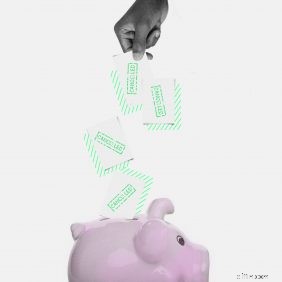50 façons d'économiser de l'argent dès maintenant
Vous devez le faire vous-même.
S'il y a une leçon à tirer de la dévastation financière causée par le coronavirus en 2020, que ce soit celle-ci :l'aide est là, mais elle ne viendra pas seulement à vous.
Cette année, vous pouvez prendre cela au pied de la lettre. Comme le savent bien les Américains qui ont passé les derniers mois à se distancier socialement, en fin de compte, vous êtes seul. Et bien qu'il existe une gamme de programmes de secours disponibles pour les millions de personnes qui ont été renversées financièrement, presque tous sont assortis de la même condition.
"Vous devez le demander - et demander de la bonne manière", comme l'a récemment dit Liz Weston de NerdWallet.
En vertu de la loi de relance du gouvernement fédéral, par exemple, si vous avez été touché par le COVID-19, vous avez le droit de prendre un « accommodement » auprès de l'émetteur de votre carte de crédit, ce qui peut inclure la suppression des frais de retard, des taux d'intérêt plus bas ou même la possibilité de sauter des paiements - sans affecter négativement votre dossier de crédit. Mais pour obtenir cet hébergement, vous devez faire les démarches en appelant l'émetteur de votre carte de crédit et en le demandant.
De même, la même loi vous donne le droit de demander une abstention sur une hypothèque garantie par le gouvernement fédéral pendant au moins 180 jours, ce qui signifie que vous pouvez sauter des paiements sans accumuler de frais de retard ou d'intérêts supplémentaires. Ces paiements peuvent être dus en une somme forfaitaire à la fin des six mois, ou vous pourrez peut-être les reporter à la fin de votre mandat - mais encore une fois, vous devez appeler votre prêteur et lui demander.
Il n'y a pas que les programmes gouvernementaux. En mars, la division de financement automobile d'Ally Bank a déclaré qu'elle accorderait aux nouveaux clients une pause sur leur premier paiement pendant 90 jours. Bank of America a déclaré qu'elle reporterait les paiements de prêt et les ajouterait à la fin du terme. La Banque TD a déclaré qu'elle renoncerait aux frais d'encaissement des comptes CD avant l'échéance complète. Mais dans chaque cas - vous l'avez deviné - vous deviez appeler et demander.
Le gouvernement ajoute 600 $ supplémentaires aux allocations de chômage hebdomadaires jusqu'en juillet. C'est automatique… si vous parvenez à obtenir des avantages en premier lieu. Se rendre aux bureaux de chômage des États est devenu un effort herculéen alors que les systèmes archaïques sont soudainement submergés. En fait, relativement peu de programmes de secours étaient automatiques. Les chèques de relance étaient, dans certaines limites de revenu, tout comme les programmes d'abstention pour les prêts étudiants fédéraux (mais pas privés).
Sinon, c'est à vous. Et d'une certaine manière, disent les experts en finances personnelles, c'est comme ça que ça a toujours été. Personne ne s'occupera de vos finances comme vous le feriez - pas un courtier, un CPA ou un conseiller financier. Et certainement pas le gouvernement.
"C'était mon objectif lorsque j'ai ouvert le groupe financier Suze Orman :rendre les gens aussi indépendants que possible des gens comme moi", déclare l'auteure et podcasteuse sur les finances personnelles Suze Orman. « Lorsque j'ai créé mon cabinet, [mes clients] ont dû s'adresser à Charles Schwab et ouvrir leur propre compte. Ils me paieraient des honoraires de conseil. Je ne gérais pas d'argent – parce que je voulais qu'ils comprennent qu'ils pouvaient gérer leur propre argent.
« Si vous voulez trouver le meilleur conseiller financier au monde, regardez-vous dans le miroir », dit Orman. "Parce que personne ne se souciera plus de votre argent que vous."
Orman dit qu'elle espère que ceux qui ont été forcés de se sortir d'un trou financier cette année n'oublieront pas à quel point c'est difficile – et s'efforceront de se mettre dans une position où ils n'auront pas à dépendre des autres la prochaine fois.
Si vous êtes prêt à prendre le contrôle de votre argent cette année, voici 50 points de départ approuvés par des experts.
Avec le reportage de Kara Cutruzzula. Illustrations d'Elisa Faye.
Découvrez les services de conseil en crédit
 Illustrations par Elisa Faye
Illustrations par Elisa Faye Vous n'avez pas à traverser une situation financière difficile par vous-même. Que vous ayez une dette importante à taux d'intérêt élevé ou que vous souhaitiez simplement des conseils sur l'établissement d'un budget et l'épargne, un conseiller en crédit certifié peut vous fournir des conseils personnalisés gratuits ou à faible coût. Couramment offerts par des organismes à but non lucratif, les conseils en matière de crédit sont une option à faible risque qui vous aide à avoir une vision plus claire de votre situation financière. Consolidated Credit a lancé Shutdown Hotline, un service téléphonique gratuit qui propose une analyse de la dette et une orientation vers des ressources spécifiques au COVID-19. Et la National Foundation for Credit Counselling (NFCC) propose également des services gratuits de conseil en crédit destinés à aider les personnes à la lumière de la pandémie.
En savoir plusDéveloppez votre "chiffre de survie"
Beaucoup de gens s'acharnent à épargner en ce moment - jusqu'où pouvez-vous aller ? Pour déterminer votre « chiffre de survie », additionnez tous les coûts mensuels de votre strict minimum :loyer, nourriture, soins de santé, etc. Vous n'êtes pas obligé de vivre avec votre budget de survie, et en calculer un ne signifie pas que vous 're embrassant un état d'esprit de rareté. En fait, il y a du pouvoir à savoir à quel point vous pouvez être ingénieux, écrit Jully-Alma Taveras, contributrice de NextAdvisor et créatrice de la chaîne YouTube Investing Latina. Le numéro de survie de Jully-Alma est de 581 $; utilisez sa feuille de calcul téléchargeable pour déterminer la vôtre.
En savoir plusOuvrir un compte de facturation
C'est idéal si vous vous retrouvez souvent à payer vos factures en retard ou à vous endetter. Sierra Howard de @IDontDoBudgets recommande de créer un compte de facturation dédié en calculant toutes vos dépenses mensuelles fixes et en ajoutant un coussin de 50 $ (pour éviter les frais de découvert). Créez un compte courant séparé, effectuez un dépôt direct mensuel sur celui-ci pour le montant total et mettez vos factures en paiement automatique à partir de ce même compte. Considérez-le comme interdit et uniquement pour les factures.
Corrigez les erreurs sur votre dossier de crédit
Nouveau cette année :les trois principaux bureaux de crédit - Equifax, Experian et TransUnion - vous permettent de vérifier votre dossier de crédit gratuitement sur une base hebdomadaire jusqu'en avril 2021. Faites la demande sur annualcreditreport.com, puis prenez 15 minutes pour parcourir votre dossier de crédit et assurez-vous que vos informations sont correctes. Selon un rapport de la Federal Trade Commission de 2013, environ un consommateur sur 5 a une erreur dans son dossier de crédit, et certaines erreurs vous coûteront de l'argent supplémentaire sur les prêts ou les polices d'assurance. De plus, avec l'extension des nouvelles options d'abstention de dette en raison des difficultés liées au COVID-19, il y a encore plus de raisons de faire une vérification de l'exactitude. Ces aménagements ne doivent pas apparaître sur votre rapport comme désobligeants. Si vous trouvez une erreur, utilisez notre modèle d'e-mail pour déposer une plainte; les bureaux de crédit seront légalement mandatés pour enquêter.
En savoir plusConfigurer les alertes bancaires
Si vous évitez de regarder les soldes de vos comptes parce que cela vous stresse, vous manquez une occasion d'être plus intentionnel avec vos dépenses. Parfois, il est préférable de laisser l'information venir à vous :accédez à votre plate-forme bancaire en ligne et définissez une alerte par e-mail ou mobile pour chaque débit de carte de crédit ou débit de compte. Vous pouvez repérer des dépenses dont vous n'aviez même pas connaissance, comme les abonnements récurrents.
Essayez une nouvelle stratégie budgétaire
Il y a de fortes chances que votre budget ait disparu cette année. Que vous ayez pris un coup sur vos revenus ou que vous ayez changé vos habitudes de dépenses sous verrouillage, c'est probablement le bon moment pour vérifier vos finances. Une tactique qui vaut la peine d'être essayée :la budgétisation à base zéro. Cela vous oblige à désigner un objectif pour chaque dollar que vous gagnez, c'est donc un excellent moyen de réinitialiser vos intentions en matière d'épargne et de gestion de la dette. Erin Lowry, auteure de "Broke Millennial" (et contributrice de NextAdvisor), affirme que c'est particulièrement utile pour les personnes aux revenus irréguliers.
En savoir plusAppuyez sur Pause sur votre prêt hypothécaire
C'est quelque chose à considérer - avec des mises en garde. La loi CARES (Coronavirus Aid, Relief, and Economic Security) a permis à la plupart des propriétaires de participer plus facilement à des programmes d'abstention, suspendant ou réduisant essentiellement les versements hypothécaires jusqu'à un an, sans nuire à leur cote de crédit ni encourir de frais spéciaux. Ceux qui ont des hypothèques garanties par le gouvernement fédéral peuvent emprunter cette voie en appelant leurs prêteurs, mais vous devez d'abord connaître les compromis. Les intérêts continueront de s'accumuler et vous devrez rattraper les paiements manqués à l'avenir.
En savoir plusDemander des allocations de chômage étendues
Les allocations de chômage sont un filet de sécurité crucial en temps de crise. Pour la première fois, de nombreux travailleurs indépendants, entrepreneurs indépendants et travailleurs à temps partiel sont éligibles aux prestations, grâce à la disposition de la loi CARES sur l'aide au chômage en cas de pandémie (PUA). Le plan de relance a également ajouté une prestation hebdomadaire supplémentaire de 600 $ à toutes les demandes éligibles, bien que cela doive expirer fin juillet. La demande de prestations peut être délicate et prendre du temps, d'autant plus que les États rattrapent un arriéré de demandes. Si vous pensez être éligible, nous vous recommandons de déposer en ligne et de vous préparer avec les informations nécessaires.
En savoir plusQuit Smoking
Everyone knows it’s an expensive habit, and COVID-19 has given us a new incentive to keep our lungs healthy. In the U.S., the average price of a pack of cigarettes is $6.28. Use this calculator to determine how much money quitting will save you weekly, monthly, even after 20 years, based on how many cigarettes you smoke a day and the cost of a pack in your area.
Call Your Lenders
 Illustrations by Elisa Faye
Illustrations by Elisa Faye If you can’t afford to pay your bills right now, it pays to be proactive. Many credit card issuers and lenders are working out deals with people who have lost income due to the pandemic, and experts say it’s in your best interest to be transparent about your situation before you fall behind. Call your lenders, explain your circumstances, and ask about any hardship programs they have in place. They might lower your interest rates, allow you to skip or defer payments, or pay later with additional interest, all of which are better options than skipping payments altogether. Liz Weston offers useful talking points here. And as Ron Lieber at the New York Times recommends, document your conversations to make sure your lenders follow through on what they say.
Get Help with Home Buying
Believe it or not, the housing market is still churning, and many Americans are moving forward with their dreams of becoming first-time homeowners. If that’s the case for you, consider whether there are any special loans, grants, or assistance programs you can take advantage of. We talked to Olivia Bernard, a 23-year-old who bought her first home in Georgia in part thanks to multiple assistance programs. Check out this list of resources, which has links to first-time home buyer services in every single state.
Read moreGet a Balance Transfer Credit Card
If you’re having trouble paying down your credit card debt because the interest portion is high and you have good credit, you might be a candidate for a balance transfer. Many of these cards offer an introductory 0% APR, meaning you can give yourself time to pay off the debt without interest. Due to the impact of COVID-19 on the economy, credit card issuers are a bit nervous about extending credit, making access and incentives less available than before the pandemic. But if you’ve got a high credit score (around 670 or higher), it’s a financial tool worth considering. Be aware this move often comes with fees:It can cost between 3% and 5% of your balance to transfer your debt to the new card.
Read moreRedirect Your Savings
How different are your spending habits today compared to six months ago? With many recreational activities ruled out because of the lockdown, one smart tactic is to take all the money you were spending on a gym membership, eating out, travel, and social activities, and funnel it into a high-yield savings account or paying down debt. Not only will you get a better sense of where you want to spend your money again when you’re able), but you’ll feel like you accomplished something when your favorite activities do return.
Build Your Emergency Fund
This one’s important. Building a savings cushion is a fundamental step toward financial wellness — one that can protect you in tough times and help you grab opportunities in good times. This year’s sudden unemployment crisis shows us not only how useful an emergency fund is, but how hard it is to achieve. Don’t be overwhelmed, though. Start small with a goal that feels reasonable to you. Putting even a few dollars away every month for the future can become a lifeline during extreme circumstances. Check out our emergency fund guide for more inspiration.
Read moreRefinance Your Mortgage
Homeowners:If you have job security and expect to be in your home for more than a few years, now could be the time to take advantage of low mortgage rates. The government has lowered both short- and long-term interest rates to encourage investments and keep the market stable. These rates give homeowners the opportunity to lower their monthly mortgage payments, adjust their loan term, or get a fixed-rate mortgage instead of a variable-rate mortgage. Don’t be afraid to shop around and compare rates from various lenders to make sure you’re getting a good deal. And don’t rush it — low interest rates are here to stay for a while, experts say.
Read moreGet a Spotify Discount
How’s this for easy listening:You can save about $12 a month by switching to a Spotify family account and splitting the cost with up to five people.
Follow the Experts
Make your screen time a bit more productive by adding a dose of money inspiration to your feed. Danetha Doe has one mission:to elevate the self-worth and net worth of women. NextAdvisor contributing editor Farnoosh Torabi answers questions and interviews notable guests three times a week on her podcast “So Money.” And Tiffany “The Budgetnista” Aliche says she has helped more than 800,000 women save more and pay off debt.
Return One Item
Look around your house or apartment. Is there anything you recently purchased that you haven’t opened or used because it wasn’t quite what you imagined or needed? Don’t let it sit there. Fill out the return form to get your money back, then arrange to have it picked up or drop it off at the post office if possible. There’s no point in eating the cost of something you’re not going to use.
Borrow From Your 401(k) — But Only If You Have To
This is usually a big no-no, but tough times require tough moves. Taking money out of your 401(k) or other retirement account can pull you off track from your long-term goals and lock in market losses, but personal finance experts say it can be a better move than taking on unmanageable debt right now. That’s partly because the calculus has changed in 2020, with federal stimulus legislation waiving the usual steep penalties that come from tapping your 401(k) early. Read up on the new rules and see if this is the right move for you.
Read moreCheck Your Subscriptions
 Illustrations by Elisa Faye
Illustrations by Elisa Faye Maybe you signed up for a cable channel for one sporting event, or subscribed to an online program when you needed to learn a certain skill. But are they still relevant to your life now? A quick scan through a credit card bill can help you discover any recurring subscriptions and monthly payments that you no longer need. Take a few minutes to cancel them and consider all the money you’re saving.
Stay Away From Credit Repair Companies
Building good credit is essential to your financial health, and poor credit will cost you. So it might seem tempting to hire a credit repair company that promises to do the work of repairing your credit score for you. Many such companies have stepped up their advertising outreach during the pandemic. But beware:These companies aren’t worth the cost, and you can do everything they promise to do by yourself — for free.
Read moreChoose a ‘No-Spend Day’
This is easier than you think, especially if you’re spending a lot of time in your home. Pick one day of the week where you commit to spending zero dollars — no ordering takeout or buying anything online. If all goes well, repeat the following week.
Upcycle Something in Your House
If you want to cut back on shopping, you can still get creative. The Instagram account @upcyclethat features tutorials to transform everyday or discarded objects into something new.
Get Credit for Your Work
Your credit report follows you for life, and it tracks your financial history in obsessive detail. Then, banks use the information on your report to calculate your credit score, a three-digit number that determines what kind of terms you’ll get on financial products like mortgages or insurance policies. Before the stakes are too high, like when you’re applying for a car loan, get familiar with how your credit score is calculated. The formula’s not a secret, and with enough time and patience you can manipulate it. Plus, the same behaviors that will boost your credit score are also likely to get you in better financial shape.
Read moreJoin an Online Community
Sometimes it’s helpful to know that other people are going through a similar situation. The free online network Ladies Get Paid has thousands of members offering help on finding a job or looking for a mentor, and NPR’s Facebook community Your Money or Your Life features advice from members on saving and investing.
Funnel Your Transportation Cash
Subway ridership in New York is down 92%, which means thousands of people are saving money usually spent on their daily commute — as much as $127 per month, if you typically buy a 30-day MetroCard. The same goes for car-friendly cities, too. Rather than spend that savings elsewhere, take the money usually spent on gas or public transportation and earmark it for a future use.
Choose the Right Bank Account
Saving money is hard. Don’t make it harder by using the wrong type of bank account. Your four main options are a savings account; a checking account; a certificate of deposit, or CD; and a money market account, or MMA. Check out our guide to choosing the right one, which is all about finding the optimal balance of interest rate, liquidity, and fees. And remember you can use a mix of accounts that suit your goals, such as CDs for a future down payment and a high-yield savings for an emergency fund.
Read moreGet Obsessed With Online Books
Your bookstore or local library might be closed, but their digital resources aren’t. Many library systems are connected to apps like OverDrive and Libby, which allow you to check out digital books from home — for free. Plus, signing up for a library card has never been easier and can usually be done from home.
Spend Your Credit Card Points
If you have a rewards credit card that racks up points with every dollar spent, now may be the time to cash them in. Maybe you were saving those points to redeem on a big trip — but if that no longer looks likely, you can instead use them to shop on your Amazon account, spend them at other stores on necessities you would have bought anyway, or even get cash back.
Use the 5-Second Rule
 Illustrations by Elisa Faye
Illustrations by Elisa Faye One trick to move forward on your money matters is to use the “5 Second Rule” created by author and talk show host Mel Robbins. It’s simple:When you have an instinct to act on one of your financial goals, Robbins says you have to do it immediately — or else your brain will find a way to shut it down. So if you want to be proactive, count backwards:5-4-3-2-1. When you reach “1,” take action. Check your accounts, look at your taxes, resist the impulse purchase. Counting down and giving yourself that window of time can distract you from worries and excuses.
Finish That Course You Already Bought
Maybe you wanted to learn a new skill or finally committed to buying the Malcolm Gladwell MasterClass six months ago, but then never actually started it. Now’s the time, according to Tonya Rapley of @MyFabFinance. You can calculate what you already spent on the course, and tell yourself you’re getting that money back — plus new knowledge — when you complete the course.
Check Out High-Yield Savings Accounts
The current national average savings rate is a measly 0.07% — but you can earn 10 times that by choosing a high-yield savings account with an online bank. If you’re fortunate to have some savings, or you’re working on building them up, consider moving that cash to a high-yield online savings account such as the ones offered by Ally and Marcus by Goldman Sachs. Your money will still be relatively accessible, but it’ll earn much more interest than it would in a traditional bank account. Compare your options, taking care to find the highest interest rate without any monthly maintenance fees or minimum balances.
Read moreConsider a New Student Loan Schedule
If you have a federal student loan, your payments have been suspended from March 13 to September 20, 2020 due to the COVID-19 crisis. This temporary relief can be extremely helpful if your income has gone down. Keep in mind that in most cases, interest will keep accruing even while you sit out payments. If your income hasn’t been affected in recent months, and you can afford it, continue making payments. And if you need your payments to be more manageable in the long term, you can talk to your loan servicer about an income-driven repayment plan, in which your monthly payment is based on your income — and in some cases can be driven down to $0.
Become a Contact Tracer
Increased testing and tracing are two strategies for preventing the further spread of COVID-19 — and contact tracing is one of the fastest-growing jobs right now. It involves calling people who came into contact with confirmed positive patients, checking symptoms, and referring them to nearby resources. Qualifications vary by state and can range from having a high school diploma to a college degree, but tracing is usually fully remote and ranges from $17 to $22 an hour. Take this free course offered by Johns Hopkins University and look up the job requirements in your state.
Work on Your Estate Plan
Nobody likes to talk about death, but you’ll do yourself and your family a huge favor if you get your affairs in order while you’re healthy. If you don’t have a will or other estate documents, consider doing it now. Working with an attorney to draw up basic documents can cost between $500 to $1,000, advises CBS News business analyst and NextAdvisor contributor Jill Schlesinger — or there are online services like Quicken WillMaker &Trust, which costs around $90. Think of it as the smartest money move you can make for the future.
Read moreNegotiate Your Cell Phone Plan
How much data do you use per month? How many texts do you send? The cell phone plan you signed up for two years ago might not be as relevant to your life today. Log in to your account, check your usage, and call — yes, call — your cell phone company to negotiate your bill or adjust your plan. Knocking even $10 off a month will add up.
Talk to Your Landlord
Typically, this isn’t the most enticing idea, but when rent takes up an average of 35% of your income, it’s a good place to look for savings. If you’re renting and plan to stay through your lease, or possibly extend, and you’ve been a model tenant so far, try asking the owner to knock some dollars off your rent. With many people plotting to move elsewhere or outside bigger cities, they might rather keep a good tenant than risk searching for a new one. You’ll gain even more leverage if you team up with your neighbors and negotiate as a group.
Make Your Contributions Count
If you’re donating to a nonprofit or social justice organization like the NAACP Legal Defense Fund, try to make your money go even further. Many employers have a charitable match program — if they do, your money could go twice as far. Ask your HR department if you can’t find any details. Plus, keep an eye out on social media, because some generous individuals are offering to personally match donations if you share a screenshot of yours.
Avoid These Home-Buying Mistakes
If you’re thinking about buying a home in the near future, get educated on the money traps you might face. Putting down a small down payment, buying a house you can’t afford, failing to get a preapproval, getting the wrong kind of mortgage … there’s a lot to look out for. That’s why we asked Chris Hogan, author and personal finance expert, to walk us through the eight most common mistakes that first-time home buyers make.
Read moreBuy a Bike
With public transportation seeing record low ridership during lockdown, many are turning to alternate forms of getting around. Consider investing in a bicycle — not only can it save you money when it comes to subway fare or putting gas in the car, but it’s a cheaper form of exercise than a gym membership. Fair warning:Other people have had the same idea, and many bicycle companies are reportedly backlogged.
Find a New Go-To Cheap Meal
 Illustrations by Elisa Faye
Illustrations by Elisa Faye Sick of canned beans? Follow @budgetbytes on Instagram for delicious recipes that are also budget-friendly, like this“pizza” pasta salad, blackened shrimp tacos, or mushroom broccoli stir fry.
Trade In Your Electronics
If you’re in the market for a new phone, don’t forget about the one you already have. Apple has a trade-in program that offers up to $500 credit for certain devices, which can be used on a new purchase or as future store credit. You can also trade in an old computer for credit via the Apple website or, starting mid-June, in Apple’s retail stores. The trade-in program extends to tablets and watches, too. For other phones, Verizon offers a trade-in program, as does T-Mobile.
Automate, Automate, Automate
If you have a pang of fear every month and ask yourself, “When’s the credit card due? Is my electric bill paid? How much should I put into savings every month?” do yourself a favor and automate most – if not all — of your online bills and investments. Setting up automatic payments once will save you time, energy, and — yes — money every month (those late fees add up). Just make sure you’re adding enough cushion to your checking account to avoid any overdraft fees.
Sell Your Old Stuff
If lockdown encouraged you to go through your closet, you can list and sell some of your old clothes on a site like ThredUp, which calls itself the world’s largest online secondhand shopping destination — and recently partnered with Walmart to expand its e-commerce resale options. If you have more than just clothes, LetGo is another marketplace where you can connect with buyers.
Check in on Your Retirement Plan
“With so many other pressing financial demands — combined with living through a global pandemic and likely recession — it’s completely understandable why you may scoff at the notion of retirement,” writes Erin Lowry. But ignoring this situation now will only make things harder in the future. Assuming you’re able to meet your essential needs right now, Lowry breaks down a few smart tactics for keeping your retirement planning on track.
Read moreCharge More
No, not on your credit card. If you’re self-employed, a small business owner, or a freelancer, take a hard look at the rates for your services. When’s the last time you increased them or gave yourself a raise? Not all industries are down this year—if you have clients who are weathering the recession, consider starting the conversation. This applies to full-time workers too. Budgeting and saving hacks will get you far, but earning more will truly power up your finances.
Do Your Taxes
This year, Tax Day was postponed until July 15, giving people a little extra time to pull together their documents and file. But if you’re still putting it off, don’t wait:Since a majority of people get refunds every year, think of it as money waiting to be received.
Nail Down Your Emergency Fund Target
Every single expert says you should have an emergency fund. But once you dig into the details, there’s a lot less agreement. Should you sock away $1,000? Three months of expenses? A year of expenses? The truth is that the answer depends on many individual factors, like your job security, your goals, and even your age. We polled 11 different personal finance experts for their recommendations — and got 11 different answers. See which emergency fund target is right for you, and let that number be your guide as your work toward your savings goals.
Read moreStop Betting on the Lottery
The average American spends nearly $70 a month on lottery tickets and betting pools, according to research released by the Bureau of Labor Statistics last year. For older Americans, that figure is even higher:up to $132 per month. If you’re one of the people driving up those averages, compare the long odds of hitting the jackpot with the guaranteed interest rate you’d get on that money if you put it into a high-yield savings account.
Get a Deal on a Car
It’s not wise to rush into any big purchase, especially a car. But the recent bankruptcy of rental-car company Hertz has flooded the market with relatively cheap used cars, and experts say you may be able to get a steal of a deal. If you need to finance the purchase, make sure you can manage the debt. Author Suze Orman says a good rule of thumb is that you shouldn’t finance a car unless you can afford to pay it off completely within 3 years.
Des économies
- 10 façons différentes d'économiser de l'eau douce
- Une petite maison peut-elle vous faire économiser beaucoup d'argent ?
- Planter un jardin peut-il vous faire économiser de l'argent ?
- Les 4 meilleures façons de gaspiller votre argent
- Les sites de remise en argent peuvent vous faire économiser beaucoup d'argent
- 5 façons d'économiser pour l'université maintenant
- 4 façons simples que votre téléphone peut réellement vous faire économiser de l'argent
- 101 façons d'économiser de l'argent
- 5 façons dont l'organisation peut vous faire économiser beaucoup d'argent
-
 5 façons d'être un télétravailleur peut vous faire économiser de l'argent
5 façons d'être un télétravailleur peut vous faire économiser de l'argent Vous dépenserez probablement beaucoup moins dargent en tant que télétravailleur. Voici quelques façons déconomiser gros. Travailler à distance comporte de nombreux avantages. Cela peut offrir la ...
-
 4 façons dont une cote de crédit élevée peut vous être bénéfique
4 façons dont une cote de crédit élevée peut vous être bénéfique Un grand crédit pourrait vraiment être utile dans plus plusieurs façons. Points clés Avoir un bon crédit facilite lemprunt à moindre coût. Il existe dautres avantages moins connus davoir un bon poi...


